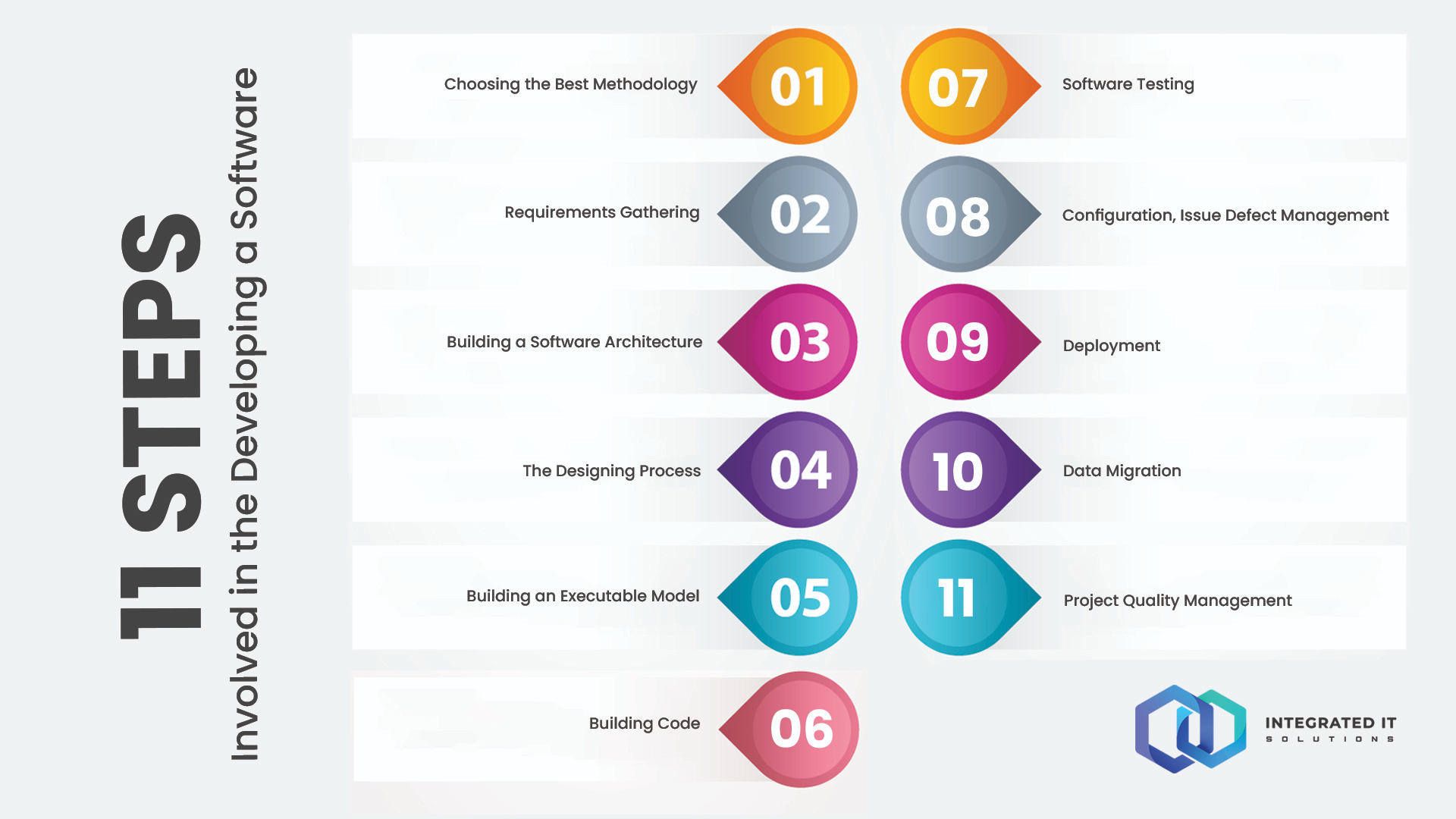Correct custom software development outsourcing can bring your business money. Accelerance study predicts that corporations will spend $133.3 billion on software development outsourcing by 2025. Outsourcing may benefit the firm, but some believe it is worth the cost. To make software development outsourcing successful, it must be done correctly. It can fail for various reasons, including ineffective communication with the outsourcing partner, selecting the incorrect partner, or having divergent expectations. So, how many software development projects can be outsourced while yet guaranteeing their success? We’ve put together our top steps to help you have a positive outsource custom software development experience.
What Is Custom Software Development?
Custom software development means creating special programs just for one company. These programs are different from the ones everyone can buy. They are made to solve specific problems and improve business operations.
Why Do Companies Outsource Custom Software Development?
When organizations want particular talents or additional assistance that is not available within their staff, they frequently resort to outsourcing. This entails contracting other specialists or firms to complete certain tasks. It’s a clever method of quickly expanding your business without recruiting additional people or investing in new equipment.
Outsourcing also allows you to connect to a global network of experienced experts who may provide fresh ideas and cutting-edge expertise.
5 Advantages Of Custom Software Development Outsourcing
Outsourcing your custom software project can bring several benefits. Here’s a strategy to help grow your business:
- Cost Savings: By working with teams in different economic environments, you can save on labor costs.
- Focus on Core Business: Letting reliable partners handle technical tasks allows your team to focus on what they do best.
- Scalability: Outsourced teams can easily adjust to project demands, making your custom software development for startups more flexible.
- Speedier Time-to-Market: With teams working in different time zones, you can have round-the-clock activity, which speeds up development cycles.
- Risk Mitigation: Spreading tasks among outsourcing partners reduces the risk compared to relying solely on an in-house team.
10 Steps To Outsource Custom Software Development
First, think about what your business needs. Then, follow these steps to find the right company to help you create software that fits your needs:
1. Internal Assessment of Needs and Requirements
Before you start looking outside your business, it’s crucial to look within. Here’s a simple strategy to help you grow your business:
- Identify your needs: Consider the problems you want the custom software to solve.
- Prioritize features: Decide which features are essential and which would be nice.
- Consider integration: Understand how the new software will work with your current systems.
Focusing on these internal aspects will prepare you to communicate with potential partners and streamline collaboration. This approach can save you time and make your business growth more efficient.
2. Scope of the Project
To grow your business successfully, understanding your project’s scope is essential. Scope means understanding your project’s goals and limits. Here are some key things to consider:
- How many people will use your app?
- How much data will you need to process?
- Will you need to keep developing your app after it’s launched?
Knowing these details will help you negotiate with service providers and avoid unexpected changes later.
3. Timeframe for Project Completion
Time is crucial, a phrase often used but consistently accurate, especially in software development. While everyone wishes for instant results, setting realistic timelines can lead to better outcomes. Here’s how:
- Allowing Innovation: Realistic timelines enable developers to innovate without rushing, ensuring high-quality code.
- Ensuring Thorough Testing: Adequate time allows for comprehensive testing, reducing issues after the launch.
- Preventing Misunderstandings: Having a clear schedule prevents misunderstandings and frantic rushes at the last minute, which could harm the final product and relationships with collaborators.
4. Decide What Your Technical Stack Is
Decide which technologies and programming languages are essential for your software development project. Make a list to discuss with your software outsourcing partner. Be clear about your preferences and stay open to their suggestions.
Based on their experience with similar projects, they may recommend other technologies that could be more suitable.
5. Budget Considerations
Know your money limits before starting a big project. Think about:
- How big and detailed your project is—more significant projects cost more.
- Money is needed after the project, like fixing things, updating, and teaching people how to use it.
Don’t spend too little or too much. You want good quality without spending too much money. Also, be ready for unexpected costs that might pop up when you least expect them, like when you’re almost done with your project.
6. Different Models for Outsource Custom Software Development
When you think about outsourcing, the software company’s location affects the cost, how easy it is to work with them, communication, efficiency, and the quality of work. Businesses that outsource software development usually consider three categories based on the location of the company:
Onshore outsourcing
This means working with a company in your own country. It’s appealing because there’s a cultural connection and fewer language barriers.
Offshore outsourcing
This involves partnering with companies across oceans, often in countries where the expertise you need is affordable. It’s like searching for treasures, but instead of gold, you’re finding skilled professionals who can bring your software ideas to life without costing a fortune.
Nearshore outsourcing
This is when you hire a company from neighboring or nearby countries. Knowing that home is close is like exploring just beyond your backyard for new opportunities.
7. Compile A List Of Software Development Partners
When choosing where to outsource your development, you must make a list of companies to evaluate. Here are some key factors to keep in mind:
- Company Size: Consider the size of the development firm. Do they have enough developers to meet your needs?
- Experience: How long has the company been in business? Choosing a company with several years of experience is best to minimize the risk of them closing during your project.
- Tech Stack: Does the company have expertise in the technology your software requires?
- Development Methods: What development methods do they use? Do they align with your team’s preferred methodologies, such as Agile or Waterfall?
- DevOps Experience: Have they completed projects using the DevOps model before?
- English Proficiency: Effective communication in English is crucial, especially for offshore or nearshore outsourcing.
- Time Zone: Ensure the development can be completed within your time zones for effective collaboration.
- Industry Experience: Look for companies that have developed software for similar industries.
- Portfolio: Review their portfolio and see if they have worked with recognizable brands or leading companies.
- Post-Development Support: Consider if they offer post-development support services and their availability in emergencies.
Once you’ve considered these factors, you can narrow your list and contact the companies directly.

8. Request A Consultation
Once you’ve chosen 5-6 software outsourcing companies, ask for a free consultation and talk to their experts. Based on your earlier research, inquire about their past projects, services, and how they work. Here are the key points to discuss:
- Your software needs.
- How long will the project take?
- Estimated costs.
- Development plan.
- Testing and feasibility.
- Contact details.
9. Evaluate Which Partner Is Right For You
Once you’ve figured out what kind of software outsourcing partner you need, it’s time to contact them. You can start by interviewing potential partners to find the best match for your business. Some partners might even offer a trial period for their developers.
It’s essential to thoroughly evaluate your software development partner before ensuring you choose the right team for your outsourcing needs.
10. Signing Contracts
Keeping everything safe is essential when you work with others and share information. This includes data like your business plans, customer details, and other important information. Here are some ways to do that:
Non-Disclosure Agreement (NDA)
This is an agreement that says both parties promise not to share any confidential information with anyone else. It includes:
- What information is confidential
- What information can be shared
- Who owns the rights to any work created
- How long the agreement lasts
- What happens if the deal is broken
Service Level Agreement (SLA)
This agreement outlines what each party can expect from the other. It includes:
- How performance will be measured
- How communication and reporting will work
- What support and maintenance will be provided
- How backups and recovery will be managed
These custom software development offerings and agreements allow both parties to work together safely and effectively.
Conclusion
In summary, picking the right custom software development outsourcing approach is crucial for your project’s success. Whether you opt for the Dedicated Team, Time and Material, Fixed-Price, Hybrid, or Staff Augmentation model, each has custom software development benefits and suits different projects based on their specific needs, size, and complexity.
Understanding these differences can help align your business goals with the most suitable outsourcing strategy. Integrated IT Solutions is an excellent choice for those looking for a dependable outsourcing partner. They offer a wealth of knowledge and expertise, ensuring that your software development requirements are handled with top-notch quality and efficiency.




